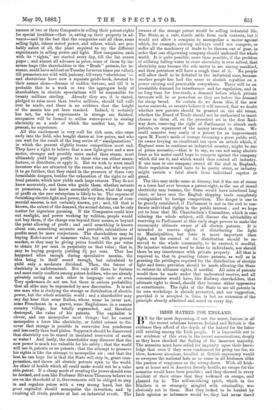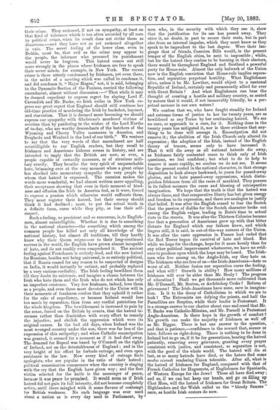IRISH HATRED FOR ENGLAND.
BY far the most depressing, if not the worst, feature in all the recent relations between Ireland and Britain is the evidence they afford of the depth of the hatred for the latter still existing among the Irish people. It is impossible not to see evidence of this even in the recent assassinations, deeply as they have shocked the feeling of the immense majority. The assassins must have relied for impunity upon their know- ledge that even if they were condemned for going too far, no blow, however atrocious, levelled at British supremacy would so overpass the national hate as to rouse in all Irishmen alike the passion of vengeance on the wrong-doers. With all Irish- men at home and in America fiercely hostile, no escape for-the assassins would have been possible ; and they showed in every incident of their crime that they reckoned on escape, and planned for it. The self-sacrificing spirit, which in the Nihilists is so strangely mingled with criminality, was obviously not in them. Had they looked to be hunted by Irish opinion as informers would be, they had never dared their crime. They reckoned, if not on sympathy, at least on that kind of tolerance which is too often accorded by all men to political crime, when its result does not strike them as disastrous,—and they have not as yet reckoned altogether in vain. The secret feeling of the lower class, even in Dublin, must be, that evil as the crime may appear to the people, the informer who procured its punishment would never be forgiven. This hatred comes out still more strongly in the places where Irishmen are free to speak their secret minds, for example, in New York. The recent crime is there utterly condemned by Irishmen, yet even there, in the midst of a meeting which was called to condemn it, and did condemn it, "Major Hogan," not, it is said, belonging to the Dynamite Section of the Fenians, carried the following amendment, almost without discussion :—" That while it may be deemed expedient to express regret for slaying Lord F. Cavendish and Mr. Burke, we Irish exiles in New York ex- press our great regret that England should still continue her old-time practice of murdering the Irish by buckshot, bayonet, and starvation. That it is deemed more becoming we should express our sympathy with Gladstone's murdered victims of eviction than by pandering to the wishes of the Lord Norths of to-day, who are worthy descendants of the butchers of the Wyoming and Cheery Valley massacres in America, and Drogheda and Wexford in the land of our birth." We venture to say that the very words of that amendment are half unintelligible to our English readers, but they recall to Irishmen and Americans hideous scenes in history, and are intended to imply that the British are now, as ever, a people capable of cowardly massacre, or of atrocious mili- tary cruelty. They breathe the very spirit of unquenchable hate, brimming over at the very moment when a great crime has shocked into momentary sympathy the very people by whom that hatred is expressed. The occasion makes the words more wonderful, we had almost written more appalling, their acceptance showing that even in their moment of kind- ness and effusion the Irish in America feel, as it were, forced to express a passion which otherwise would suffocate them. They must register their hatred, lest their enemy should think it had declined ; must, to put the actual truth in a definite form, curse while they pity, or lose their self- respect.
Such a feeling, so persistent and so rancorous, is, to English- men, almost unintelligible. Whether it is due to something in the national character—the something which among the common people has killed not only all knowledge of the national history, but almost all traditions, till they hardly know why their Queen reigns—or to their long-continued success in the world, the English have grown almost incapable of hate, and do not readily even comprehend it. The ancient feeling against Frenchmen is entirely dead, and the new hatred for Russians, besides not being universal, is so entirely political, that if Russia ceased for any reason to be suspected of designs on India, it would instantly be extinct, and probably replaced by a very curious cordiality. The Irish feeling bewilders them till they doubt its existence, and imagine a chasm between the Irish who hate them and the Irish who do not which has only an imperfect existence. Very few Irishmen, indeed, love them as a people, and even those most devoted to the Union will in their moments of frankness confess that they uphold it rather for the sake of expediency, or because Ireland would lose too much by separation, than from any cordial patriotism for the whole kingdom. The bewilderment is increased to pain by the sense, forced on the British by events, that the hatred in- creases rather than diminishes with every effort to remedy the injustice, and abolish the oppression which were its original causes. In the bad old days, when Ireland was the most wronged country under the sun, there was far less of the expression of this antipathy ; and when Catholic emancipation was granted, it seemed for a moment as if it had died away. The demand for Repeal was based by O'Connell on the rights of Ireland, not on the detestableness of England ; and in the very height of his effort he forbade outrage, and even open resistance to the law. Now every kind of outrage finds apologists, who are popular in the ratio of their hatred ; political assassination commences when the country is ringing with the cry that the English have given way ; and the first victim selected for the knife is the messenger of peace, because it was peace he promised. It would seem as if Irish hatred did not gain its full intensity, did not become completely active, until there mingled with it some flavour of contempt for British weakness. No such language was ever used about a nation as is every day used in Parliament, by men who, in the security with which they use it, show that the justification for its use has passed away. They utter it, no doubt, in part to secure their seats, but in part also from an internal impulse, which they must know as they speak to be imprudent to the last degree. Were their lan- guage that of friends, Coercion Bills would, in the present temper of the English cities, be next to impossible ; while, but for the hatred they confess to be burning in their electors, there would be throughout England and Scotland a powerful party for Home-rule. Almost the only bulwark of the Union now is the English conviction that Home-rule implies separa- tion, and separation perpetual hostility. What Englishman alive, unless it be Mr. Lowther, would object to a cantonal Republic of Ireland, certainly and permanently allied for ever with Great Britain ? And what Englishman can bear the thought of creating a hostile and military country, so seated by nature that it would, if not immovably friendly, be a per- petual menace in our own waters ?
We confess that we, who have fought steadily for Ireland and extreme forms of justice to her for twenty years, are as bewildered as any Tories by her continuing hatred. ?We see no cure, or approach to a cure, for it. Nothing done in the twenty years has mitigated it, nor is there evidence that any- thing to be done will assuage it. - Emancipation did not remove it ; the abolition of the Irish Church only altered its expression ; the adoption of the Irish, instead of the English theory of tenure, seems only to have increased it.
That it will die away as all national hatreds die away, as Irishmen fairly contented cease to think only of Irish questions, we feel confident ; but what to do to help to remove it more rapidly, we confess we do not see. It seems for the present rooted in the national character, in that strange disposition to look always backward, to yearn for passed-away glories, and to hate passed-away oppressions, which distin- guishes Irishmen from all the races of mankind. They possess in its fullest measure the curse and blessing of retrospective imagination. We hope that the truth is that the hatred was always there, and that comparative liberty has but given energy and freedom to its expression, and there are analogies to justify that belief. It was after the English ceased to fear the Scotch that the passion of dislike for the Scotch character broke out among the English vulgar, leading in Bute's time to actual riots in the streets. It was after the Thirteen Colonies became free that a generation of Americans grew up with that bitter distaste for England which our fathers knew, and which lingers still, it is said, in out-of-the-way corners of the Union. It was after the caste oppression in France had ended that the Red Terror began its carnival of hate and blood. But while we hope for the change, hope for it more keenly than for any other political improvement whatsoever, we have no evid- ence to produce upon which the hope may be based. The Irish- men who live among us, the Anglo-Irish, say they hate us. The Irishmen who are free of us—the Irish-Americans—hate us worst of all. Neither fusion nor separation cures the feeling, and what will ? Growth in ability ? How many millions of Irishmen will ever be abler than Mr. Healy ? The progress of education ? Shall we get thousands more cultivated than Mr. O'Donnell, Mr. Sexton, or Archbishop Croke ? Reform of grievances ? The Irish-Americans have none, save in imagina- tion. Is it to the decay of Catholicism to which we are to look ? The Extremists are defying the priests, and half the Parnellites are Sceptics, while their leader is Protestant. It is a strange answer to our chatter about race and creed that Mr.
T. Burke was Catholic-Milesian, and Mr. Parnell is Protestant Anglo-American. Is there hope in the growth of comfort I No growth can make the majority of Irishmen as well off as Mr. Biggar. There is but one answer to the question, and that is patience,—confidence in the reward that, sooner or later, follows on right-doing. There is nothing to be done in Ireland but to go on, if it be for generations, bearing the hatred patiently, removing every grievance, granting every prayer consistent with justice, and consistent, as separation is not, with the good of the whole world. The hatred will die at last, as so many hatreds have died, or the haters find some modus vivendi rendering Union tolerable. After all, what is the hatred of Irishmen for England, compared with that of French Catholics for Huguenots, of Englishmen for Spaniards, of Western Europe for the Jews These all have died away ; and so, if we can but keep our heads, and go on filling up Chat Moss, will the hatred of Irishmen for Great Britain. The Highlanders and the Welsh called us the "bloody Saxons" once, as hostile Irish orators do now.

































 Previous page
Previous page